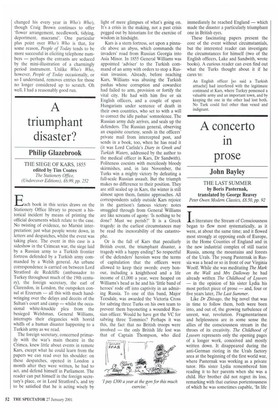A triumphant disaster?
Philip Glazebrook
THE SIEGE OF KARS, 1855 edited by Tim Coates The Stationery Office, (Undercover Editions), £6.99, pp. 252 Each book in this series draws on the Stationery Office library to present a historical incident by means of printing the official documents which relate to the case. No twisting of evidence, no Marxist interpretation: just what people wrote down, in letters and despatches, whilst the event was taking place. The event in this case is a sideshow in the Crimean war, the siege laid by a Russian army to a Turkish frontier fortress defended by a Turkish army commanded by a Welsh general. An urbane correspondence is carried on between Lord Stratford de Redcliffe (ambassador to Turkey throughout much of the 19th century), the foreign secretary, the earl of Clarendon, in London, the outspoken consul at Erzerum — all this with much handwringing over the delays and deceits of the Sultan's court and camp — whilst the occasional white-knuckle plea from the besieged Welshman, General Williams, interrupts their elegancies with horrid whiffs of a human disaster happening to a Turkish army as we read.
The foreign secretary, concerned primarily with the war's main theatre in the Crimea, knew little about events in remote Kars, except what he could learn from the papers we can read over his shoulder: on these despatches, opened in London a month after they were written, he had to act, and defend himself in Parliament. The reader can put himself in the foreign secretary's place, or in Lard Stratford's, and try to be satisfied that he is acting wisely by light of mere glimpses of what's going on. It's a crisis in the making, not a past crisis pegged out by historians for the exercise of wisdom in hindsight.
Kars is a stem fortress, set upon a pinnacle above an abyss, which commands the invaders' road from Russian Georgia into Asia Minor. In 1855 General Williams was appointed 'adviser' to the Turkish command of an army with orders to stop a Russian invasion. Already, before reaching Kars, Williams was abusing the Turkish pashas whose corruption and cowardice had failed to arm, provision or fortify the vital city. He had with him five or six English officers, and a couple of spare Hungarians under sentence of death in their own countries, who set to with a will to correct the idle pashas' somnolence. The Russian army duly arrives, and seals up the defenders. The Russian general, observing an exquisite courtesy, sends in the officers' private mail from intercepted post, and sends in a book, too, when he has read it (it was Lord Carlisle's Diary in Greek and Turkish Waters, addressed by the author to the medical officer in Kars, Dr Sandwith). Politeness coexists with mercilessly bloody skirmishes, and, in late November, the Turks win a mighty victory by defeating a full-scale Russian assault. But the triumph makes no difference to their position. They are still sealed up in Kars, the winter is still almost upon them, famine approaches. All correspondents safely outside Kars rejoice in the garrison's famous victory: notes smuggled through from General Williams are like screams of agony: 'Is nothing to be done? Must we perish?' It is a Greek tragedy: in the earliest circumstances may be read the inexorability of the catastrophe.
Or is the fall of Kars that peculiarly British event, the triumphant disaster, a tragedy with a happy ending? So respectful of the defenders' heroism were the terms of capitulation that the officers were allowed to keep their swords: every honour, including a knighthood and a life income of £1,000 a year, were heaped on Williams's head as he and his 'little band of heroes' rode off into captivity in an admiring Russia. To one of this band, Major Teesdale, was awarded the Victoria Cross for sabring three Turks on his own team to prevent them bayoneting a wounded Russian officer. Would he have got the VC for sabring three Tommies? Perhaps it was this, the fact that no British troops were involved — the only British life lost was that of Captain Thompson, who died immediately he reached England — which made the disaster a particularly triumphant one in British eyes.
These fascinating papers present the core of the event without circumstantials, but the interested reader can investigate the circumstances for himself (two of the English officers, Lake and Sandwith, wrote books). A curious reader can even find out what the Turks thought about it if he cares to: An English officer [so said a Turkish atttache] had interfered with the legitimate conimand at Kars, where Turkey possessed a valuable army and an important town, and by keeping the one in the other had lost both. No Turk could feel other than vexed and indignant.






















































































 Previous page
Previous page